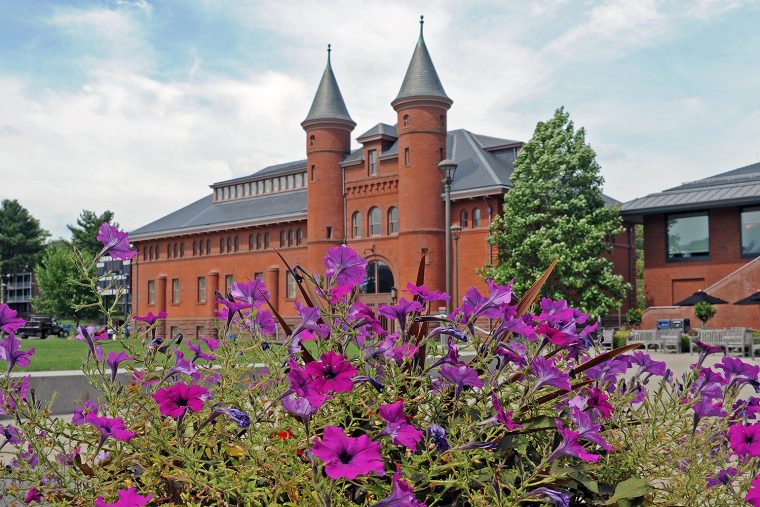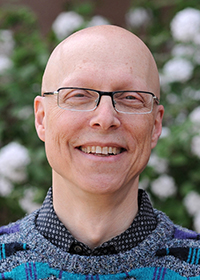The Impact of Action Teaching


At the first Faculty and Staff Lunch Talk following the COVID-19 pandemic, held April 4, Professor of Psychology Scott Plous stood before the assembled group of faculty and staff to discuss the merits of action teaching.
He began his presentation with a quote from the inaugural address of Wesleyan University’s first president, Willbur Fisk: “education should be directed with reference to two objects—the good of the individual educated, and the good of the world.”
“Action teaching,” a term first coined by Plous in his 2000 publication for Teaching of Psychology, integrates real world problem solving, philanthropy, and advocacy with traditional classroom coursework to foster stronger connections between learning and living. He is currently working on a book about action teaching to be published by the American Psychological Association.
“The core idea behind action teaching is that it contributes to peace, social justice, and sustainable living at the same time that it educates students,” Plous said.
Action teaching complements Wesleyan’s mission of empowering students to go out into the world and be changemakers—whether they study the arts, sciences, or some combination of both.
Plous, who has won numerous awards for his teaching, including the Binswanger Prize for Excellence in Teaching (twice), has taught social psychology at Wesleyan University for more than 30 years.
In 2013, Plous was invited by President Michael Roth to “test drive” one of his social psychology courses in a new online learning platform called Coursera. Plous was unsure at first whether action teaching would work in a large online course.
But eventually, Plous decided to give it a try and launched his MOOC (massive open online course), Social Psychology. The course covered topics such as decision making, persuasion, group behavior, personal attraction, and factors that promote health and well-being, and included exercises that pushed students to apply the psychology practices they had learned to their decisions and interactions in daily life.
The classwork culminates in a final project called the Day of Compassion, which Plous has been assigning to Wesleyan students for more than 20 years. The Day of Compassion has also garnered attention in the past from media outlets like the BBC and NPR.
“The assignment challenges students to live as compassionately as possible for a full 24 hours and then use social psychology research and findings to analyze the experience. It’s an example of action teaching because the students are learning about course topics like the psychology of empathy or bystander intervention or the psychology of intergroup bias even while they’re doing tangible good in the world,” Plous said.
Plous found that nearly two-thirds of students reported a greater understanding of themselves, and two-out-of-five students reported becoming more compassionate toward other people, in a survey of students months after the course ended. Applying their learning to real world situations significantly affected students’ lives and their behaviors—a ripple effect that holds massive potential to promote social and political change.
Plous encouraged all faculty members to consider incorporating action teaching into their courses, regardless of department or discipline. “This approach can address any number of societal issues,” Plous said.
He offered a few tips for instructors who want to try it. Start by identifying a societal issue that is important to you and, ideally, related to your course content. Then brainstorm course-related activities that could address that issue. Students taking a course on philanthropy or persuasion, for instance, might learn by developing a fundraising campaign that donates money to a nonprofit group chosen by the class, Plous said. Or students studying biology or bioethics might be tasked with writing a letter to the editor on an important issue using datasets or other evidence-based research to educate the public while also contributing to the larger conversation.
He also encouraged faculty to take advantage of community-engaged learning experts on campus. The Jewett Center, Community Engaged Learning, the Center for the Arts, and Office of Sustainability are collaborating to create the Community Matchbox, a database that individuals on campus can use to find opportunities to share ideas, resources, expertise, and needs with the local community.
During the question and answer portion of the presentation, Amy Grillo, associate professor of the practice in the Allbritton Center for the Study of Public Life, offered herself as a resource to colleagues. “One thing that I can do in my office is help faculty think about pedagogically sound integration of action teaching and community engagement into their courses, whether it is a semester-long community engaged course, or a single component of a course, like an assignment or one-time activity,” Grillo said.
To date, Plous’s Social Psychology MOOC has enrolled nearly 1.3 million students from countries all around the world. When asked how he avoids “compassion fatigue” after so many decades on the job, Plous credits the compassion shown by his students.

